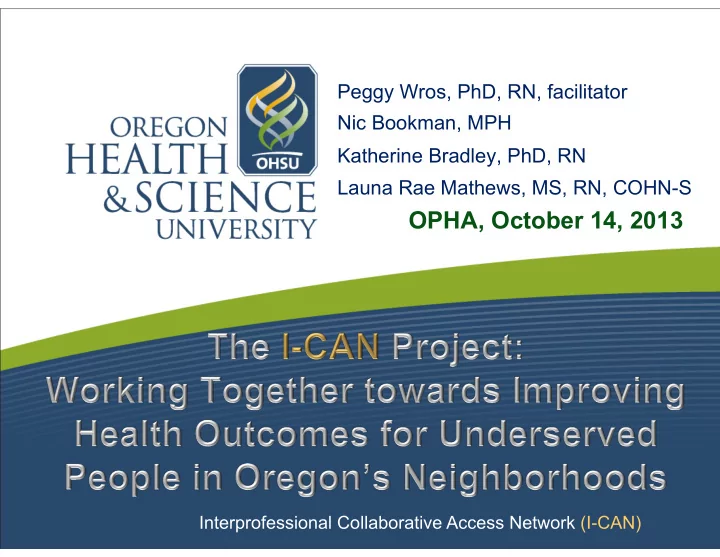

Peggy Wros, PhD, RN, facilitator Nic Bookman, MPH Katherine Bradley, PhD, RN Launa Rae Mathews, MS, RN, COHN-S OPHA, October 14, 2013 Interprofessional Collaborative Access Network (I-CAN)
History of the Neighborhoods Necessity is the Mother of invention February 2007: OCNE grant application Spring 2007: SW Portland Neighborhood 1 year grant-funded pilot
Other Neighborhoods: Portland Spring 2007: SW Portland Spring 2008: SE Portland Spring 2009: Old Town Portland Spring 2011: Mt. Angel Winter 2012: Rockwood/Gresham
I-CAN • 3-year, $1.5 million award from the Health Resources and Services Administration (HRSA) • Improves access to health care services for the uninsured, isolated, or medically vulnerable • Aligns with the OHSU Interprofessional Initiative
Purpose of I-CAN • Expand partnerships between OHSU, neighborhood clinics, and community service agencies. • Create a collaborative model for clinical practice and interprofessional education. • Address Triple Aim goals : Improve outcomes, reduce cost, increase satisfaction
I-CAN Academic Partners • OHSU School of Nursing • OHSU School of Medicine • OHSU Global Health Center • OHSU/OUS College of Pharmacy • OHSU School of Dentistry
I-CAN Year 1 Community Partners
I-CAN Year 2 Community Partners
I-CAN Year 3 Community Partners
Specific I-CAN Goals 1. Develop collaborative interprofessional practice and education partnerships. 3. Improve health outcomes and satisfaction. 3. Build capacity for leading interprofessional teams.
Interprofessional Collaborative Practice (IPCP) 10 Core Competencies • Professional knowledge • Professionalism and and skills ethics • Reasoning and • Interprofessional judgment teamwork • Evidence-based • Safety and quality practice and research improvement • Lifelong learning • Systems • Communication • Client/patient centered care
I-CAN In the Press
I-CAN Grant Team • Peggy Wros, Project Director • Launa Rae Mathews, Project Manager • Heather Voss, Project Co-manager • Katherine Bradley, Evaluator • Tanya Ostrogorsky, Evaluator • Nic Bookman, Evaluation Coordinator • Jennifer Boyd, Provost’s Office Project Associate • Patrick Brunett, School of Medicine Liaison • Juancho Ramirez, College of Pharmacy Liaison • Jill Mason, School of Dentistry Liaison • Mary Anna Gordon, IPCP Educator • Valerie Palmer, iCHEE Coordinator
The I-CAN Project: Neighborhood Connections
I-CAN: Care Management with Interprofessional Student Teams “WELCOME” to the Neighborhood!
I-CAN: Neighborhood Collaborative Academic Practice Partnership Neighborhood 1. Community agencies 2. Residents 3. Student care management teams 4. Faculty in Residence (FIR)
I-CAN Project: NCAPP – Old Town Neighborhood and people who live there NCAPP Academic Health Care Community Service Partner Service Provider Agencies OHSU (SON, SOM, SOD, Central City Concern Macdonald Neighborhood Center House College of Pharmacy) OHSU Global Health (iCHEE) Neighborhood Collaborative for Academic Practice Partnerships (NCAPP)
I-CAN: Starting Year 1 in Old Town Building partner networks Exploring innovative ways to improve health Learning about interprofessional collaborative practice (IPCP)
I-CAN Project: Care Management (CM) and Follow Up I-CAN Project I-CAN CM clients Student Care Project from NCAPP Management and FIR Agency Teams Client home visits I-CAN Project Individual-focused NCAPP Population- “huddles” with Based Care Discussion NCAPP agency and Action Plan
I-CAN: Neighborhood Residents Relationship building
I-CAN: Individual and Population-Based Interventions Learning to “ZOOM”
I-CAN: Student Care Management Teams
I-CAN: Faculty in Residence
I-CAN Project: Acknowledgements NCAPP Agency Liaisons Old Town Portland – Central City Concern, Chuck Sve – Macdonald Center, Kristrun Grondal & Sarah Knuth – Neighborhood House, Donna Trilli West Medford – Family Nurturing Center, Mary Curtis-Gramely, Beth Jaffee-Stafford – La Clinica, Traci Fossen – St. Vincent de Paul, Socorro Holloway SE Portland – Asian Health & Service Center, Christine Lau – Lutheran Community Services NW, Pierre Morin – Richmond Clinic, Erin Kirk NCAPP: Neighborhood Collaborative for Academic Practice Partnerships
The I-CAN Project: Incorporation of Technology
I-CAN Incorporation of Technology
I-CAN Incorporation of Technology Data Collection
I-CAN Incorporation of Technology Remote Interpreters
I-CAN Incorporation of Technology Health Education
I-CAN Incorporation of Technology Security Device Network Folder
I-CAN Incorporation of Technology Security
I-CAN Incorporation of Technology Challenges • Onboarding of students as research staff. • Uniformity of training. • Dedicated Citrix environment and settings. • Cellular connectivity in Old Town.
The I-CAN Project: Laying the Evaluation Framework
I-CAN Project: External Factors
I-CAN Project: Assumptions about IPE Models • Strengthen capacity • Reduce health disparities • Link health & community services
I-CAN Project: Evaluation Inputs Client Student Grant Team Teams Academic Community Partners Partners
I-CAN Project: Client Outcomes Improve Health Literacy Short Increase Life Management Skills Improve Access Medium Improve Satisfaction Improve Health Outcomes Long Improve Quality of Life
I-CAN Project: Student Learning Outcomes Challenges facing the underserved Working in interprofessional teams Short Understanding community health systems Providing interprofessional care to Medium underserved populations
I-CAN Project: Community Outcomes Short Improve networks & resources Increase collaboration Medium Established navigation resources Improve community care Long coordination resources
I-CAN Project: Academic Partner Outcomes Short Build faculty interprofessional partnerships Increase collaboration between Medium academic & community partners
I-CAN Project: Grant Team Outcomes Logistic and process coordination Short Effective data collection Robust partner engagement Medium Care coordination systems New IPE models for community Long health systems
I-CAN Project: Aggregate Health Outcomes Hospital utilization ED utilization EMS 911 callouts Insured rates
I-CAN Project: Chuck Sve, L.Ac. (Central City) “We believe that training students to work in interprofessional teams, with complicated patients, is a worthwhile investment for our future in healthcare. We ask that students bring enthusiasm, open minds , and a spirit of learning, as that benefits us all. We invite you to use your time here to grow into the compassionate, resourceful, and collaborative practitioners of the future.”
Disclaimer This project is supported by funds from the Bureau of Health Professions (BHPr), Health Resources and Services Administration (HRSA), Department of Health and Human Services (DHHS) under grant number UD7HP25057 and title “Interprofessional Care Access Network” for $1,485,394. This information or content and conclusions are those of the author and should not be construed as the official position or policy of, nor should any endorsements be inferred by the BHPr, HRSA, DHHS or the U.S. Government.
Recommend
More recommend